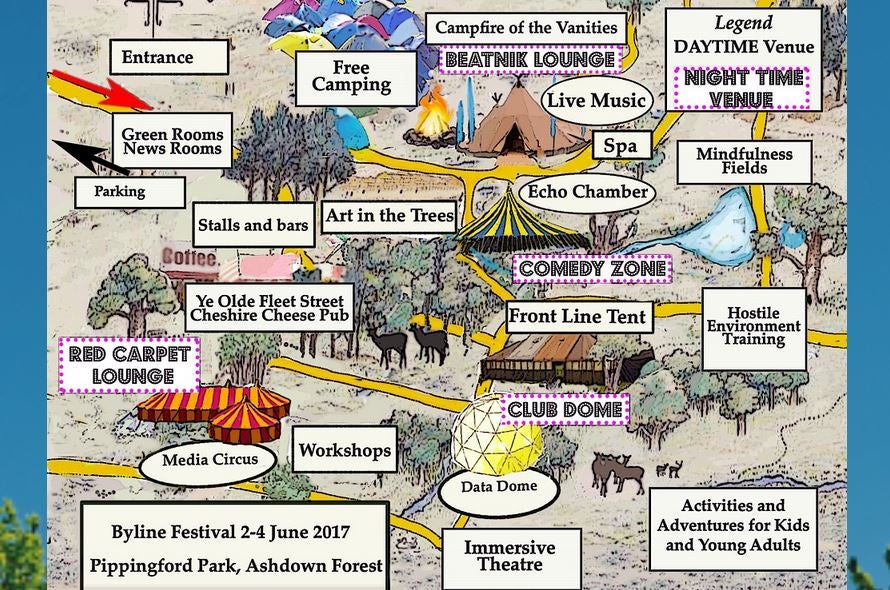
What claims to be the UK’s first ever festival for independent journalism gets underway at Pippingford Park in the East Sussex countryside this weekend (June 2-4).
The three-day Byline Festival, billed as “the Sundance of Journalism”, is organised by the crowdfunded journalism website, Byline, and starts on Friday with a discussion entitled ‘Political coverage is broken’. Daytime debate on the media industry’s fast moving ecology will be accompanied by skills workshops, screenings, activism, music and comedy.
Peter Jukes and Stephen Colegrave, co-directors of Byline Media, say they first came up with the idea for the festival in the wake of Brexit and the rise of Donald Trump.
“Information should be a democratic right and the festival is for the public good; it’s about promoting free speech and diversity,” says Jukes, who in coming years also plans to take the festival to New York.
Three large tents – The Media Circus, The Echo Chamber and The Data Dome – will host debate on everything from “the wisdom and idiocy of crowds on social media” and the dangers of group think, to dark money, algorithms, block chains, surveillance and Putin bots.
Panel discussions include: “The industrialisation of the Mind” (artificial intelligence or machine learning: who gave algorithms an automatic authority?), “Beyond Satire”, “Silence and abuse’ (the difficulties of reporting historic child sexual abuse) and “The Good Migrant” (the negative portrayal of migrants is a betrayal of British history).
The festival will also host the “Bad Press Awards” presented by John Cleese and is likely to feature categories such as “most mendacious column” and “most misleading headline”. Prizes will separately be given to whistleblowers and outstanding student journalists.
Amongst the journalists, bloggers, satirists, lawyers, activists and performing artists taking part, big names include: Lolita Jackson from the New York Mayor’s office on exclusion in the media, Damian Collins, Chair of the Culture, Media and Sport Select Committee on whether political coverage is broken and Wikimedia chief executive Lucy Crompton-Reid in an “Ask Wikimedia” session.
Martin Bell, OBE, will give the opening address in “Can Journalists ever be independent?” and New York University’s Jay Rosen will give a keynote speech on the state of post truth and how we can get out of it.
The organisers don’t expect to make a profit in the first year of the festival. However, Jukes is hopeful that the watering holes will do well: “You can’t get journalists to pay for anything; they always want free passes, but they do like to drink.”
The Byline website was founded in 2015 by the young Korean entrepreneur Seung-yoon Lee and Economist journalist Daniel Tudor before being sold last year to Jukes and Colegrave. Like many other independent crowdfunded journalism websites, it’s struggling to pay its journalists in today’s crowded media marketplace, and its news coverage and investigations can be intermittent.
Earlier this year, the Daily Mail sought to sue Byline over three stories it published about payments made by the paper’s owners, Associated Newspapers, to a private investigator Steve Whittamore. The Daily Mail eventually backed down, but not before the Byline website had raised over £15,000 to pay its journalists to carry on investigating the paper.
“We are pro the press; we believe in evidence and facts,” says Jukes, who built up a 22,000 Twitter following from his live coverage of UK’s phone-hacking trial in 2014/15.
Jukes says Byline does not have a political agenda, but is happy with ideological journalism, as long as it is rigorous: “We are not the gatekeepers, we are the gate openers.” He hopes the festival will be a celebration of the same values of free speech and independent journalism.
Email pged@pressgazette.co.uk to point out mistakes, provide story tips or send in a letter for publication on our "Letters Page" blog
